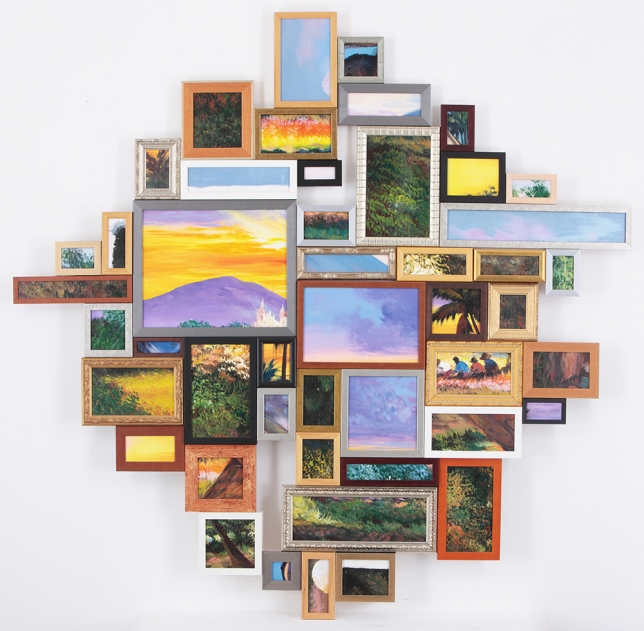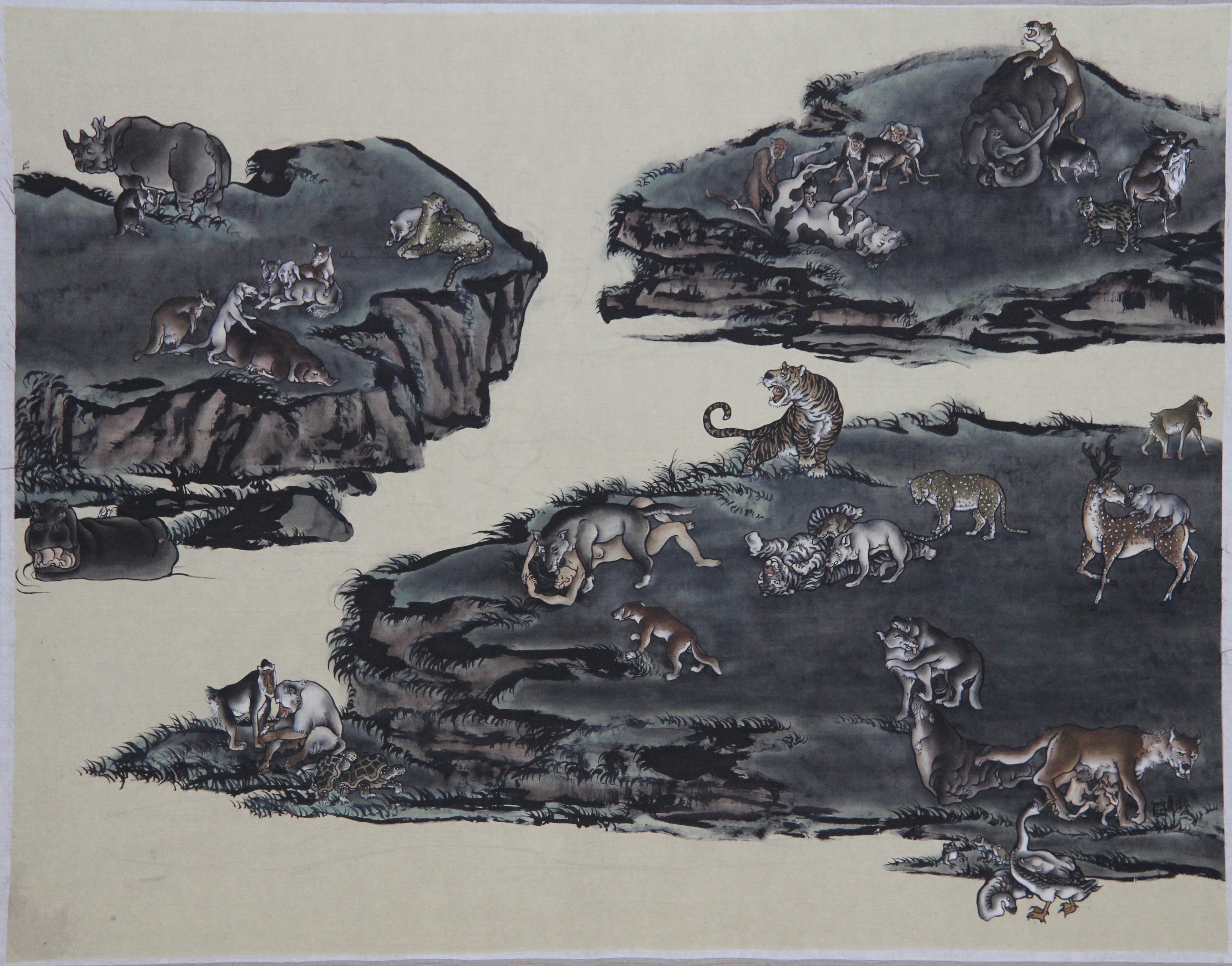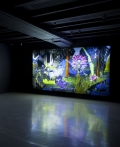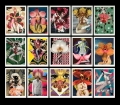LAND, LANDSCAPE, AND UTOPIA
Group Exhibition
29 March - 13 May 2017
Opening | Tuesday | 28 May, 6 - 9 PM | ARNDT Fine Art at Gillman Barracks (Block 47, #01-25)
Land, Landscape and Utopia features current tendencies on the genre of landscape by selected contemporary artists from China, Southeast Asia and Australia. The participating artists are: Isabel & Alfredo Aquilizan, Del Kathryn Barton, Qiu Zhijie, Rodel Tapaya, Entang Wiharso, and Yang Jiechang.
A landscape is originally defined as a natural scenery of mountains, valleys, trees, rivers and forests, especially where the main subject is a wide view, with its elements arranged into a coherent composition. The sky is almost always included in the view, with the weather playing an important part of the composition. The two main traditions of landscape painting spring from Western and Chinese art, going back well over a thousand years in both cases. Landscape art may be entirely imaginary, or copied from reality with varying degrees of accuracy. In this group show, the artists take the idea of an imagined landscape to the point where it shifts to a paradisiac or utopian (sometimes dystopian) scenery.
The artist couple Isabel & Alfredo Aquilizan (b. 1962 in the Philippines but are based in Australia) began the landscape “Mabini Art Project” series in 2009. Traditional Mabini paintings are ‘kitsch’ Filipino landscapes created by local artisans, churned out in the thousands and dripping with sentimentality. Recent trips back to the Philippines made them reflect at length on the financial aspects of the art market and how art assumes a different value depending on the context in which it is exhibited. They commissioned a local Mabini painter to produce hundreds of works, which they then reconfigured through reframing, cutting or occluding, with the fragments either reframed or segmented into semi-sculptural works or disjointed murals. In the process of transformation, the resulting works become a commentary on the contemporary art landscape, as well as a reflection on authorship and co-creation.
“I am not a woman but a world”, is a phrase you find pinned in Del Kathryn Barton’s (Australian, b. 1972) studio in Sydney, Australia. The statement speaks volumes about the artist, whose position in the world is defined by a symbolic language articulating what it means to exist in the multiple guises of womanhood and to tread the finely balanced path between fantasy and domesticity. Her exhibited work, “Inside another land” transforms the female body with the beauty of nature into a kaleidoscope of exotic flowers and sensuous forms. Based on Oscar Wilde’s eponymous fairy tale, the animation, “Nightingale and the Rose” brings to life the artist’s paintings, transporting us into a surreal universe that is an ode to unrequited love.
In his creation of maps, Qiu Zhijie (Chinese, b.1969) adopts a methodology that incorporates daily experience, as well as a philosophical approach to thinking with graphics and organising systems of knowledge. This map series presents Qiu’s investigation into cartographic history. From his archaeological analysis of pre-Columbian, trans-oceanic contact theories, to the systemisation of motives, logics and methods of different map-making approaches, he links together history, philosophy, mythology and science. In this particular series, the artist weaves a narrative dealing with the underlying connections between a phantom island, ‘Utopia,’ and monsters: fear and temptation.
At the heart of Rodel Tapaya’s (Filipino, b. 1980) work is his ongoing amalgamation of folk narrative and contemporary reality within the framework of memory and history. Utilizing a range of media - from large acrylic on canvas to an exploration of under-glass painting, traditional crafts, diorama, and drawing - Tapaya filters his observations of the world through folktales and pre-colonial historical research, creating whimsical montages of his characters. In “Homage to Multi-Petalled Beauty,” Tapaya further excavates Filipino pre-colonial beliefs in animism, interpreting myth and folk aesthetics in an unfurling landscape of lush scenery and enigmatic symbols. Inherent in the video work is a tension between formalistic investigations of art and the subjectivity of perception and experience.
Entang Wiharso’s (Indonesian, b. 1967) ongoing series, “Promising Land” refers to the issue of homes and land ownership towards establish a life. This work observes the history of human migration and references the ‘Promised Land’ narrative that was given by God to Abraham and his descendants. Territorial rites are constantly related to history, economy and political power; since the beginning of time, individuals have migrated or escaped from their birthplace, whether as refugees or to discover new lands. In traditional western painting, landscapes mostly served as backgrounds to portraits, typically suggesting the parks or estates of a landowner. In “Powerless: Promising Land Story n.2,” Entang Wiharso depicts quite the opposite: man without land.
Yang Jiechang (Chinese, b. 1956) presents two paintings that are part of the series, “Stranger than Paradise.” An exploration and interrogation of our globalised world, these works call into question the concepts of control and instability that govern our systems of collective living. Thus, a second and closer look on the apparent depiction of ‘paradise’ might even reveal a dystopian scenery. Yang has questioned both social and political events of today’s societies and his own life as an artist working between Europe and Asia. Linking Chinese aesthetics and thinking to contemporary cultural change, the artist delivers an allegory of our globalised world.
Press contact: peychuan@arndtfineart.com

















